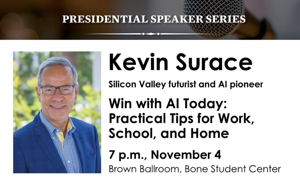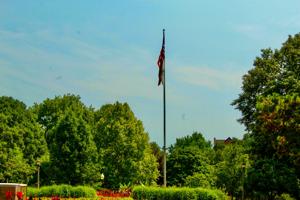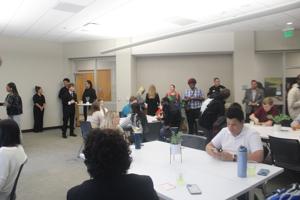ISU students hoping to make a positive impact by voting on Election Day
Illinois State University is giving students the opportunity to vote today on campus for the 2024 election. Students can vote from 6 a.m. to 7 p.m. in the Brown Ballroom at the Bone Student Center. When entering the first floor of the Bone Student Center, students can vote and register to vote at the Brown Ballroom, visit tables answering questions regarding voting and high-five Reggie near the voting location. If voters are still in line at 7 p.m., they are entitled to vote. At 10 a.m. today, the line outside the Brown Ballroom of interested voters was short and moved fast. However, the line inside the Brown Ballroom was long. The Center for Civic Engagement has encouraged students all semester long to vote early to avoid waiting in a potential long line on Election Day. ISU students said this year's election has caused them anxiety as they are worried about how it will impact the United States moving forward. Senior physical education major Julie Crews is anxious about this election and shared why she decided to vote. “I just knew it was a big election. I was not going to do it at first, but I was reminded of how big this election was,” Crews said. “I just thought that I should vote, and I’m glad that I did.” Senior special education major Amanda Stringer shared her joy in being able to vote in this year’s election. “It feels good,” Stringer said. “It feels like I’m really making a change and really impacting the world. I just can’t describe the feeling.” Junior finance and economics major Alessia Lowe explained why she chose to vote on Election Day as opposed to voting early. “It just feels more official and authentic. There’s just something special about voting on Election Day,” Lowe said. Senior horticulture and landscape management major Tommy Hayes said he feels prepared for the election. “I feel good, my faith comes first in everything I do. I try to make it that way, and I feel that this is the first time I’ve used my faith and made this election my own thing, as I have researched both candidates,” Hayes said. This year is the first time Hayes is voting in a presidential election. Hayes said the voting experience feels “insane.” “[This] feels kind of nuts,” Hayes said. “I was about six or seven months too young to vote in the last [presidential] election. The last one was also crazy and being able to have a say in this one is also kind of nuts, but I’m excited.” Hayes also chose to vote on Election Day for more “intention” rather than participating in early voting. “I was always used to seeing my parents vote on Election Day. It just feels like the intentional way to do it,” Hayes said. “That’s what Election Day is for.”
Latest Vidette
- ISU to host Kevin Surace for Presidential Speaker SeriesIllinois State University is bringing back the Presidential Speaker Series after a hiatus due to the COVID-19 pandemic. The first event will take place at 7 p.m. Nov. 4 in the Brown Ballroom at the Bone Student Center. All events in the series will be free and open to the public. The first speaker is Kevin Surace. He is known as the “father” of voice AI and is currently the CEO and chief technology officer at Appvance.ai. He has 94 worldwide patents. Surace is also chair of the Silicon Valley Forum and a Consumer News and Business Channel top Innovator of the Decade. His speech is titled “Win with AI Today: Practical Tips for Work, School and Home.” “He’s really optimistic,” Roy Magnuson, director of emerging technologies for instruction and research and professor of music theory and composition, said. “I think he is sort of a vehicle for change and an optimist through that because it is a transitional period [right now],” Magnuson continued. Director of Presidential and Trustee Events Rachel Caracci encourages all people to attend. “We truly believe it’s relevant to everyone—students, faculty, staff and community members alike,” Caracci said. “Whether [people] are curious about AI, thinking about its impact on their career or just want to hear from a dynamic speaker, this talk will offer something valuable.” “This series was created to bring thought[ful] leaders to campus who can inspire, challenge and engage our community in meaningful conversations about timely topics,” Caracci continued. More information can be found here.
- ISU prepares for WKCFA renovation project, announces planned sidewalk closuresStarting Monday, construction crews will work to prepare the southeast corner of the Illinois State University Quad according to an ISU media release. A two-year-long construction plan, the WKCFA renovation project, will update and expand the Wonsook Kim College of Fine Arts. In addition to the construction, pedestrian traffic will be rerouted for part of the project. According to the release, ISU will mark the detoured route prior to the closure as a part of the temporary traffic control permit issued by the Town of Normal. Constitution Trail traffic will be rerouted using Fell Avenue and College Avenue. An additional alternative route will include traveling north on University Street and then east on West Virginia Avenue to the Camelback Bridge trail entrance. The release said that pedestrians using the South School Street sidewalk at the intersection of Beaufort Street will be directed to the Fell Avenue crosswalk. For more information on the WKCFA’s transformation plans, click here.
- Coffehouse Corner series continues with live music from Nelly's EchoAs a part of the Coffeehouse Corner series, Event Management, Dining and Hospitality (EMDH) hosted artist Nelly’s Echo at the Starbucks Stage in the Bone Student Center on Wednesday. Students sat at tables and booths to talk, do classwork or listen to the performance. Freshman English major Winnie Phillips attended the event to work on assignments, get Starbucks and enjoy the live music. “The intersection of both [the environment and the music] was perfect,” Phillips said. Sophomore journalism and marketing double major Madison Jockisch enjoyed the artist’s connection with the crowd through jokes and callouts. Monalisa Lamptey, a project management graduate student and EMDH representative, believes many students have created bonds at past Coffeehouse Corner events. “Some students, they don’t know each other, but then they meet and are able to connect,” Lamptey said. Nathan Redmore, a freshman history education major and Redbird Well representative, agreed with Lamptey. “I think Coffeehouse Corner is a great opportunity to find community, and it’s also a good opportunity for us at Redbird Well and EMDH to spread the resources available,” Redmore said. The Coffeehouse Corner event concluded with Nelly’s Echo receiving a round of applause from attendees. To continue the Coffeehouse Corner series, EMDH has another event scheduled from 7-9 p.m. Tuesday, Nov. 4, with a performance from musician Alex Ahn. Future Coffeehouse Corner events also include a trivia night on Nov. 18, as well as a craft night on Dec. 2.
- Tips to keep trick-or-treaters safe this HalloweenWith Halloween on Friday, it is important to consider ways to stay safe while having fun. Choose a costume that allows you to be safe, especially for trick-or-treaters. The American Red Cross offers safety suggestions, including using face paint instead of a mask, avoiding colored contact lenses, adding reflective tape to costumes or trick-or-treat bags, wearing light-colored clothing and avoiding long, trailing fabric. When trick-or-treating, stay on the sidewalk and cross the street only at corners after looking both ways. Be cautious around animals, especially dogs. Also, use a flashlight and have a parent or responsible adult go with children. If older children are trick-or-treating alone, plan their route and set a curfew. Parents should check children’s candy before allowing them to eat it. Also, if planning on passing out candy, make sure there are no obstacles and the porch light is turned on. For adults hosting parties, ensure everyone has a safe way home. Some common practices include collecting keys from people who will be drinking, planning a designated driver or having guests stay the night. To ensure pets are safe, keep them out of candy, especially chocolate, and in a separate area if throwing a party. If dressing pets in costumes, make sure they are comfortable and that the costume doesn’t restrict their movement, eyesight or breathing. Also, keep pets on a leash and use a reflective collar or harness with identification attached when taking them outside in case they run away. To stay safe in case of fire, wear fire-resistant clothes and to use battery-operated candles if carving a pumpkin. The American Red Cross provides supplies to meet immediate needs after a fire, as well as mental health services and one-on-one support.
- Town of Normal meet-and-greet educates students about town council, Normal departmentsThe Town of Normal held a meet-and-greet, an event where students had the opportunity to connect with individuals on the town council and various department heads. Parks and Recreation Director Doug Damery discussed the importance of networking with students. “A big initiative for me personally right now, and I think for my profession, is recruiting high school and young college kids and older college kids, for that matter, and [letting] them know that parks and recreation is a career, especially municipal parks and recreation,” Damery said. He also explained that there were many opportunities for students in parks and recreation, especially in the Chicago area, where departments tend to be more comprehensive. “So, depending on what [their] interest is … we kind of sometimes fit into that,” Damery said. Some local leaders gave insight into their department’s actions that students may not be aware of. Normal Fire Chief Mick Humer highlighted the fire department’s role and what it does. “I don’t think people realize how involved we are in all kinds of community activities and events and everything like that,” Humer said. “I mean, one of our things as a fire department is risk reduction and everything like that. We want accidents to not happen,” Humer continued. Humer explained specific jobs the fire department has within the Illinois State University community. “We do a lot of fire drills. We do a lot of stuff on campus with fraternities and sororities because, historically, they’ve had problems with fires,” Humer said. “Our doors are always open. If somebody has any kind of problem or issue, we tend to try to help people, whatever and whenever we can,” Humer continued. Students also talked to local politicians, including Normal Mayor Chris Koos. Sophomore political science major Peyton Albert interacted with Koos. “He’s been mayor for 23 years … he described the music scene here as it kind of went away for a while, and now it’s starting to finally come back,” Albert said. Students can learn more about town council members here.
- ALPFA and ALAS provide ISU students opportunity to celebrate Día de los MuertosIn honor of Día de los Muertos, the Association of Latino Professionals for America (ALPFA) and the Association of Latinx American Students (ALAS) held a celebration in the Multicultural Center. The event aimed to inform students on the traditions and cultural significance of Día de los Muertos. Snacks and activities were available to students, including face painting. Around 60 students participated in the event. Sophomore accounting major and ALPFA member Omar Gomez discussed the importance of the event. “With this event, we dug a little deeper. Day of the Dead is very meaningful to a lot of Latinos and Hispanics around the world, so the activities are [what] we focused on,” Gomez said. Students were able to decorate photo frames for their deceased loved ones, paint sugar skull magnets, make paper marigolds and enjoy pan de muerto and Mexican hot chocolate. ALAS president and senior international business major Emely Garces highlighted the picture frame decorating activity. “The ofrenda is special, and people who are in dorms want an ofrenda in their houses, too. I feel like we can give that resource to them so they can decorate it and put it in their dorms,” Garces said. Students were also able to utilize the Multicultural Center’s printer for photos of their loved ones. Participants left with face paint and crafts. Students who would like to participate in Día de los Muertos are encouraged to place pictures of their deceased loved ones on the ofrenda located across from the front desk in the Multicultural Center until Monday, Nov. 3.













